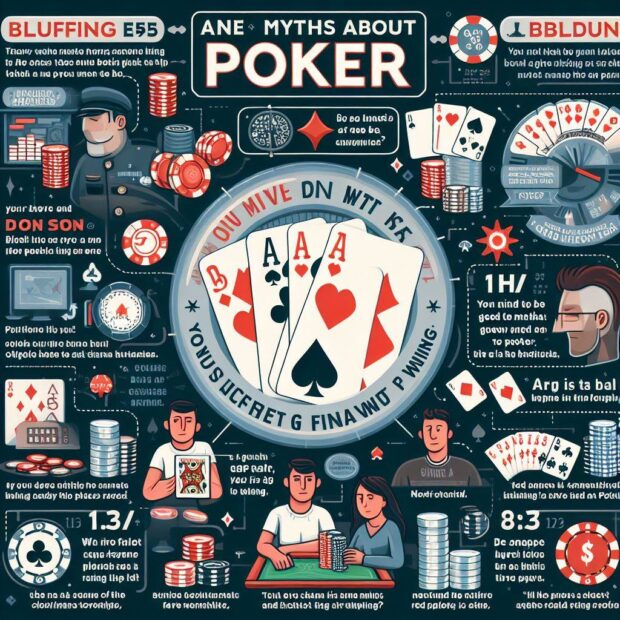From Luck to Skill: Demystifying Poker Myths

Skill: Demystifying Poker Myths
- Introduce the common perception of poker as a game of luck and the debates surrounding its classification as a skill game.
- State the purpose of the post: to demystify common poker myths and highlight the significant role of skill in successful poker play.
The Nature of Poker: Luck vs. Skill
- Discuss the inherent elements of luck in poker, acknowledging the role of randomness in the short term.
- Transition to the skill components, emphasizing decision-making, strategy, and psychological warfare as crucial for long-term success.
Demystifying Common Poker Myths
- Myth 1: Poker is All About Luck
- Present arguments and evidence supporting poker as a skill-based game, Skill: Demystifying Poker Myths including statistical analysis and the consistent success of professional players.
- Myth 2: Good Cards Guarantee Wins
- Explain the importance of betting strategy, table position, and player psychology over merely having good cards.
- Myth 3: Bluffing is the Most Important Skill in Poker
- Discuss the role of bluffing within a broader array of strategic skills required for poker, including discipline and patience.
- Myth 4: Poker is Easy Money
- Explore the challenges and complexities of poker as a profession, including bankroll management and the variance experienced even by top players.
- Myth 5: Online Poker is Rigged
- Address concerns about online poker fairness, presenting evidence of regulatory oversight and the integrity of reputable poker sites.
How Skill Determines Long-Term Success in Poker
- Dive into the concept of the “skill edge” and how it applies over the long term, using examples of skill factors that can tilt the odds in a player’s favor.
- Discuss the importance of continuous learning, game theory, Skill: Demystifying Poker Myths and adapting to opponents’ strategies.
The Psychology of Poker: Beyond the Cards
- Examine the psychological aspects of poker, including reading opponents, managing one’s own emotions, and the psychological battles between players.
- Highlight stories of poker professionals who excel in psychological warfare.
Improving Your Poker Skills: Tips and Strategies
- Provide actionable advice for readers looking to enhance their poker skills, focusing on areas such as mathematical understanding, psychological insight, and strategic study.
- Suggest resources for learning, such as books, online courses, and poker analysis software.
Success Stories: Proof of Skill in Action
- Share success stories of renowned poker players who have consistently demonstrated that skill plays a decisive role in achieving poker success.
- Analyze key hands or tournaments that showcase the strategic depth of poker and how skill overcomes luck.
Conclusion
- Recap the key points made throughout the post, reinforcing the argument that while luck plays a role in the short term, poker is predominantly a game of skill.
- Encourage readers to approach poker with a mindset geared towards learning, strategy, and long-term skill development.
Additional Elements
- Include quotes or insights from professional poker players and industry experts to support arguments and provide credibility.
- Feature infographics or charts that illustrate the skill aspects of poker, such as decision trees or probability calculations.
This outline offers a robust framework for a blog post aimed at demystifying the myths surrounding poker and highlighting the skills that define the game’s most successful players. By elaborating on each section, you can provide a comprehensive and engaging read that educates your audience on the complexities and depth of poker strategy.
Baca Juga: All In: Advanced Tactics for Casino Poker Champions


